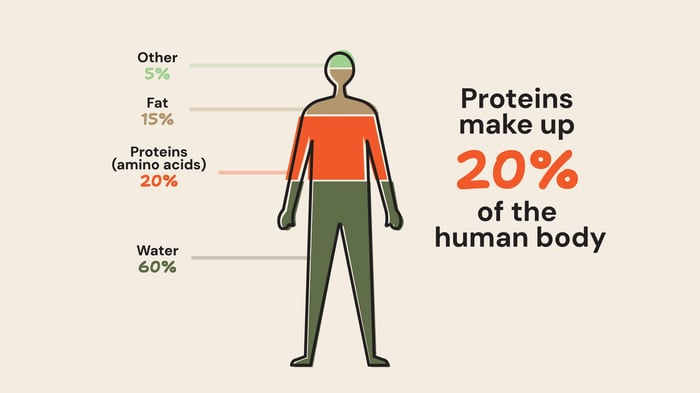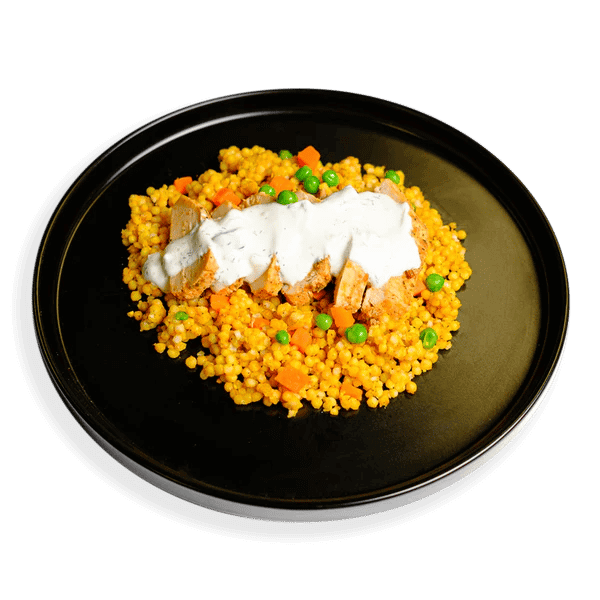Fueling Goals One Gram at a Time
You've probably heard how important it is to consume enough daily protein if you want to build muscle.
But what about if you’re trying to lose weight? Or even better, doing both at the same time?
We’re diving into one of my all-time favorite topics in fitness: body recomposition, aka recomp.
If you’re not familiar with recomp, you’re in for a treat. It’s the process of losing fat while gaining lean muscle. Yes, it’s possible. And as illuminated in the study below, protein plays a key role.
Protein is the building block of your cells, muscles, and metabolism. It helps your body build healthy tissues, burn fat, and function at its best, which is exactly why we designed MyFitFoods meals with an average of 30-50 grams of protein per serving.
Protein is crucial. It’s not just for bodybuilders. It’s for everybody. And truth be told, many people do not get enough quality protein in their diets.
What is protein?
Protein is one of the three essential macronutrients that provide energy to the body, alongside carbohydrates and fats. The term "macro" refers to the large amounts required by the body, in contrast to micronutrients like vitamins and minerals, which are necessary in smaller quantities.
Dietary protein is made up of chains of building blocks called amino acids. When you eat protein, your body breaks it down into amino acids, which are then used to build and repair tissues and support vital functions.
Unlike carbohydrates and fats, the body does not store protein. This makes it essential to consume adequate protein each day to maintain overall health.
Amino Acids
We can think of amino acids as Legos; they can be used to build different proteins. Amino acids compose about 20% of our bodies by weight. After water, they are the next largest component of our bodies. For example, the body of a person weighing 110 lbs contains about 22 lbs of amino acids. (1)

Amino acids facilitate:
healthy brain function
muscle building
immune function
cell building and much more!
So, keep the daily protein supply steady because amino acids are hard at work making it all happen!
High Protein vs Low Protein Study
With recomp fresh in our minds, let's get into one of the most fascinating studies I’ve come across in my career. Published in the American Journal of Clinical Nutrition:
Higher compared with lower dietary protein during an energy deficit combined with intense exercise promotes greater lean mass gain and fat mass loss: a randomized trial
demonstrated that during a caloric deficit (40%), a higher-protein diet was more effective at reducing fat mass while simultaneously increasing lean body mass (hello recomp) when combined with consistent high-volume resistance training.
Study Overview
Over four weeks, 40 men were randomly assigned to two groups (20 per group).
Two Groups:
High-Protein Group (PRO): Consumed 2.4 grams of protein per kilogram of body weight per day.
2.4 g/kg ≈ 1.09g per pound daily.
Control Group (CON): Consumed 1.2 grams of protein per kilogram of body weight per day.
1.2 g/kg ≈ 0.54g per pound daily.
Study Control:
Caloric Intake: Both groups followed a hypoenergetic diet, meaning a diet that provides less energy than the body requires, of approximately 40%
Exercise: Participants engaged in resistance training combined with high-intensity interval training six days per week.
Key Findings:
PRO Group
Lean Body Mass Gain: +2.65 lbs
Fat Mass Loss: −10.58 lbs
Total recomp: ~13 lbs
CON Group
Lean Body Mass Gain: +0.22 lbs
Fat Mass Loss: −7.72 lbs
Total recomp: ~8 lbs
High Protein Study Conclusion
An addition of just .5 on top of the .55 grams of protein per pound of body weight daily led to almost double the recomp in just four weeks!
That’s remarkable.
This study clearly shows that a higher protein intake during a calorie deficit, combined with intense exercise, is significantly more effective for promoting recomp than a lower protein approach.
Simply put: if you're cutting calories and training, more protein means better results.
All that said:
How Much Protein Do You Need Daily?
This is the big question, and one that sparks a lot of continuous debate. As many of our readers know, there is rarely a one-size-fits-all answer when it comes to nutrition. Your optimal daily protein intake will depend on multiple factors, including:
weight
sex
age
health goals
Our Answer
At MyFitFoods, we don’t believe in broad generalizations when it comes to your health journey. Instead, we create personalized plans based on your unique needs and goals. When you come to visit us, you'll step on our InBody scanner, a non-invasive tool that analyzes body composition, including lean muscle and body fat. Using this data, our team members will help you develop a customized nutrition strategy, including protein intake, tailored just for you. (This service is completely free for anyone who steps foot in any MyFitFoods location)
Sometimes that may look like 1g of protein per 10 calories consumed, other times it will be different. The point is we tailor your plan according to you.
Institutional RDA of Daily Protein Intake
According to Harvard Medical School and WebMD, the standard Recommended Daily Allowance (RDA) for protein is 0.36g (.8g per/kg) of protein per pound of body weight. Which looks like:
120 lbs - 43 grams/day
150 lbs - 54 grams/day
180 lbs - 65 grams/day
The State of the Protein Debate
The debate over daily protein intake remains a perpetually unsettled one, with many fitness influencers online arguing that higher intake than the RDA is necessary for those aiming to build muscle. While others caution that excessive protein consumption can lead to health issues. The debate ultimately represents the futility that is applying a one-size-fits-all approach to health and nutrition.
I’ll leave you with this: a meta-analysis from data from 49 studies with 1,863 participants, concluding:
“Dietary protein supplementation significantly enhanced changes in muscle strength and size during prolonged RET (resistance exercise training) in healthy adults…With protein supplementation, protein intakes at amounts greater than ~1.6 g/kg/day do not further contribute to RET-induced gains in FFM (fat-free mass). (2)How to Get This Protein In
Whether you're following the institutional RDA, your custom MyFitFoods plan, or experimenting with advice you’ve seen online, being strategic about protein intake is key to hitting your goals, especially if you're focused on muscle building or recomp.
Muscle Protein Synthesis
To build and repair muscle, your body relies on a process called Muscle Protein Synthesis (MPS), which is triggered by resistance training and protein intake. The key driver of MPS is the amino acid leucine. To effectively stimulate muscle growth, you need to reach what's called the leucine threshold each day.
Whey Protein
One of the most effective ways to hit the leucine threshold is through whey protein supplementation, and here’s why:
Whey protein is naturally high in leucine, about 11% by content (3)
It’s rapidly absorbed, delivering amino acids to your muscles quickly
It contains a complete profile of essential amino acids
The Importance of Clean Protein Sources
No matter how much protein you consume, quality matters. Many whey protein supplements can contain hormones, antibiotics, steroids, and other contaminants that work against your long-term health.
That’s exactly why MyFitFoods created a 100% grass-fed whey protein isolate, free from harmful fillers and designed to help you hit your protein thresholds effectively.
Not only is this the whey protein I take, but we were so confident in the quality of our product, we’ve put our 100% grass-fed whey protein head-to-head against top protein supplements.

MyFitFoods Meals
Not everyone is trying to pack on muscle, and if that’s the case, a whey protein supplement might not make sense for you. The most common and natural way to get protein is through the foods we eat every day.
High-Protein Foods Include:
Meat, poultry, and seafood
Dairy products like eggs, milk, and cheese
Beans, nuts, and seeds
This is where MyFitFoods comes in. Each meal is designed to contain an average of 30–50 grams of protein per serving, making it easy to hit your daily targets while enjoying real food. You can explore all our MyFitFoods meals and see the complete macronutrient breakdowns listed for each item.
MyFitFoods + Caloric Deficit = Results
Let’s say you’re eating in a caloric deficit of around 40%, like the participants in the study mentioned. If your meals come primarily from MyFitFoods, you’ll not only stay on track with your calories, but you’ll also be meeting the daily protein intake necessary to facilitate recomp.
Final Thoughts: The Power of Protein
There is a lot of debate and nuance in the world of daily protein intake. But one thing is certain: the importance of making protein a cornerstone of each meal.
Whether your goal is to build muscle, lose fat, or do both at the same time, daily protein intake is a key to unlocking real change. The science is clear: higher protein, when paired with training and a calorie deficit, drives better body recomposition results.
At MyFitFoods, every meal and supplement is designed with these principles in mind.
Because after all, we’re here to make real results your reality.




